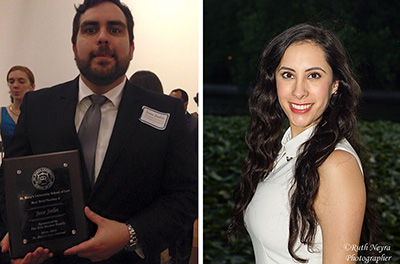Helping Students Get One Step Closer to Law School
 Texas Appleseed believes that law school should be accessible to all qualified students, so one of our earliest projects was establishing a scholarship to help students of color expand their law school options. The scholarship covers the full cost of a Kaplan (LSAT) prep course, as well as connects students with mentors who are well-established attorneys.
Texas Appleseed believes that law school should be accessible to all qualified students, so one of our earliest projects was establishing a scholarship to help students of color expand their law school options. The scholarship covers the full cost of a Kaplan (LSAT) prep course, as well as connects students with mentors who are well-established attorneys.
With more than 300 scholarships awarded to date, Texas Appleseed caught up with two former recipients — 2013 recipient Jesus (Jesse) Joslin and 2011 recipient Annabel Pedraza — on what the Diversity Legal Scholars (DLS) program meant to them.
How did getting the DLS scholarship help you?
JJ: It allowed me to take an LSAT prep course I would not otherwise have been able to afford, and it paired me with a well-respected and outstanding attorney-mentor who met with me several times throughout the year and prepared me for the rigors of law school.
AP: Being selected as a DLS scholarship recipient allowed me to enroll in an LSAT prep course, which dramatically increased my LSAT score.
Where did you grow up, and what made you set your sights on law school? Did you know any attorneys growing up?
JJ: I grew up in Alice, Texas — a small community 45 minutes west of Corpus Christi. I always considered myself an advocate and one who calls out perceived injustice when I see it, but I did not set my sights on law school until the latter half of my undergraduate years. I grew up in a low-income household and was raised by a single Grandmother in public housing. I did not know any attorneys growing up.
AP: I grew up in a suburb of Dallas in Carrollton, Texas. I did not know any attorneys growing up, but I decided to attend law school my senior year in college. I always planned to go into business, but when it was time to find a job after graduation, I realized that I was not ready to stop learning. I also realized that I wanted to do something more fulfilling and not just work to increase the profit of my employer. As such, I decided that I wanted to enroll in a graduate program. Because I did not like science or math, medical school was out of the question. I had already decided I wanted to divert from business, so I eliminated an MBA as an option. All that was left was law school. So after undergrad, to determine if law school was the right choice (it was,) I found a job as a legal assistant at a nonprofit that represents survivors of domestic violence, human trafficking, or sexual assault in immigration law and family law matters.
Growing up, did law school seem within the realm of possibility for you? If so, what made you think you could pursue this dream? If not, what obstacles did you face or what made it seem out of reach?
JJ: Graduating high school was an accomplishment that no one in my immediate family had ever accomplished, so graduating from a university, let alone law school, seemed like a pipe dream. It was not until I started being successful at work and at UT that I realized, "I can do this!"
AP: As the first in my family to attend college in the U.S., grad school was not a consideration, simply because I did not set my dreams that high. I realized my classmates had advantages that I didn’t have: I saw how my classmates knew attorneys, or whose parents were attorneys, and I was able to see the benefits of getting advice, such as which courses to enroll in or what type of internships to pursue. This gave them a competitive advantage, and in law school, competitive advantage is everything. I started to seek out mentors and to ask questions to everyone I came across, and I found that a lot of people are happy to offer guidance.
What is/was the most exciting part about law school?
JJ: I attend St. Mary's University School of Law in San Antonio. The most exciting part about law school so far has been leading the social justice-related law review as Editor in Chief, and working with my friends and colleagues to shine light on various issues within the law that disproportionately affect the poor, people of color, immigrants, and other marginalized groups in our society.
AP: I attended SMU Dedman School of Law in Dallas, Texas. I loved the friendships I made in law school. To be able to make friends in an environment full of stress, competition, and lack of sleep is very special, and your law school classmates are the only ones that truly understand your law school experience. What I loved most about law school is that I learned a whole different way of thinking and seeing the world. I do not consider myself the same person I was when I started law school.
What type of law would you like to practice or what are you doing now?
JJ: I would like to be a civil litigator and practice public interest work on the side.
AP: I am currently employed by the U.S. Department of Justice, Executive Office for Immigration Review. I am doing a judicial clerkship in an immigration court in Arizona.
What would you say to others who are considering applying for Texas Appleseed's scholarship and who are considering law school in general?
JJ: Texas Appleseed is an amazing organization! The DLS program is but one example of the ways in which Texas Appleseed aims to uplift disadvantaged groups, and it is an invaluable resource. As for law school, there is no better way to hone the skills you need to make an impact on society and on the multitude of political, social, and legal controversies that exist in our society.
AP: DO IT! Apply for any and all scholarships; the benefit is far greater than the cost. For anyone considering law school, know that it is not hard; it is just a lot of work. Once you acknowledge and accept that a lot of work does not mean difficult work, the law school experience will be more enjoyable.
This post is part of Texas Appleseed’s 20th anniversary celebration. Between now and the end of December, we’re celebrating 20 of our proudest accomplishments. Learn about the rest of our work here and on social media. Donate now if you want to support the next 20 years of fighting for justice.

